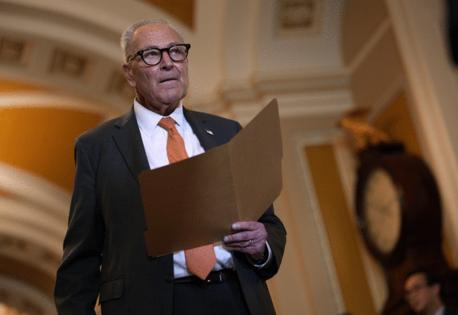Shutdown risks rise as Democrats issue ambitious counteroffer
Published in Political News
WASHINGTON — An increasingly rancorous standoff over funding the U.S. government intensified Wednesday as congressional Democrats swung big on a counteroffer, ratcheting up the risk of an Oct. 1 shutdown.
Democrats are demanding President Donald Trump and congressional Republicans agree to health care policy changes that House Speaker Mike Johnson has said have “zero” chance of becoming law as part of the spending bill.
The minority party’s proposal presents as a list of priorities written in legislative text, from which items could be taken to build a consensus for any future compromise plan. However, as of now, no such serious talks are taking place, Democratic Leader Chuck Schumer told reporters.
“Ask the Republicans if they are willing to shut the government down,” Schumer told reporters, adding that Republican leaders have not asked Democrats to negotiate “at all.”
The Democrats’ bill would repeal Medicaid cuts enacted in July as a way to offset some of the costs of Trump’s signature $4 trillion tax and spending cut bill. Democrats are also seeking a long-term extension of expiring Obamacare tax subsidies, a proposal that could cost hundreds of billions. Schumer declined to address the cost of the subsidies.
Without renewal of the Obamacare subsidies, many Americans will get notices of a surge in their health insurance premiums when open enrollment begins Nov. 1 for coverage next year. Democrats’ proposed stopgap would run through Oct. 31, just before that opening deadline, while the GOP proposal would fund the government through Nov. 21.
Republicans need support from at least seven Senate Democrats to pass a government funding bill in that chamber. So far, Schumer has held firm in his opposition to the Republican’s bill.
GOP leaders, meanwhile, have signaled they aren’t planning to negotiate on health care as part of the stopgap process. Senate Majority Leader John Thune earlier told reporters any counteroffer with major health care provisions attached to a short term spending bill is “totally unserious” and that a discussion of Obamacare subsidies can happen at a later date.
Senator Susan Collins, a Maine Republican who chairs the chamber’s spending panel, said she’s worried enough Democrats won’t cross party lines.
“They are certainly under a lot of pressure from Senator Schumer,” she said.
Schumer, in turn, faulted Republicans for not being willing to negotiate at all and seeking to jam Democrats instead with a take-it-or-shut-down offer.
_____
(With assistance from John Harney.)
_____
©2025 Bloomberg L.P. Visit bloomberg.com. Distributed by Tribune Content Agency, LLC.
























































Comments